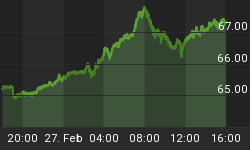Trading, and to some extent investing, is all about knowing when markets are moving with the wisdom of the crowds and when they're moving with the madness of the crowds. In recent years, there has seemed to be much more madness than wisdom (a statement which can probably be generalized beyond the financial markets themselves, come to think of it). Where do we stand now?
I think a recent letter by John Hussman of Hussman Strategic Advisors, entitled "An Open Letter to the FOMC: Recognizing the Valuation Bubble In Equities," is worth reading. Hussman is far from the only person, nor even the most august or influential investor, questioning the valuation of equities at the moment. Our own valuation models have had the projected 10-year compounded real return of equities below 3% for several years, and below 2% since late April. For a time, that may have been sustainable because of the overall low level of real rates, but since the summertime rates selloff the expected equity premium has been below 1.5% per annum, compounded - and is now below 1% (see Chart, source Enduring Investments).

Hussman shows a number of other ways of looking at the data, all of which suggest that equity prices are unsustainable in the long run. But what really caught my eye was the section "Textbook speculative features", where he cites none other than Didier Sornette. Sornette wrote a terrific book called Why Stock Markets Crash: Critical Events in Complex Financial Systems, in which he argues that markets at increased risk of failure demonstrate certain regular characteristics. There is now a considerable literature on non-linear dynamics in complex systems, including Ubiquity: Why Catastrophes Happen by Mark Buchanan and Paul Ormerod's Why Most Things Fail: Evolution, Extinction and Economics . But Sornette's book is one of the better balances between accessibility to the non-mathematician and utility to the financial practitioner. But Hussman is the first investor I've seen to publicly apply Sornette's method to imply a point of singularity to markets in real time. While the time of 'breakage' of the markets cannot be assessed with any more, and probably less, confidence than one can predict a precise time that a certain material will break under load - and Hussman, it should be noted, "emphatically" does not lay out an explicit time path for prices - his assessment puts Sornette dates between mid-December and January.
Hussman, like me, is clearly of the belief that we are well beyond the wisdom of crowds, into the madness thereof.
One might reasonably ask "what could cause such a crash to happen?" My pat response is that I don't know what will trigger such a crash, but the cause would be the extremely high valuations. The trigger and the cause are separate discussions. I can imagine a number of possibilities, including something as innocuous as a bad "catch-up" CPI print or two that produces a resurgence of taper talk or an ill-considered remark from Janet Yellen. But speculating on a specific trigger event is madness in itself. Again, the cause is valuations that imply poor equity returns over the long term; of the many paths that lead to poor long-term returns, some include really bad short-term returns and then moderate or even good returns thereafter.
I find this thought process of Hussman's interesting because it seems consonant with another notion: that the effectiveness of QE might be approaching zero asymptotically as well. That is, if each increment of QE is producing smaller and smaller improvements in the variables of interest (depending who you are, that might mean equity prices, long-term interest rates, bank lending, unemployment, etc), then at some point the ability of QE to sustain highly speculative valuations goes away and we're left with the coyote-running-over-the-cliff scenario. Some Fed officials have been expressing opinions about the declining efficacy of QE, and Janet Yellen comes to office on February 2nd. I suspect the market is likely to test her very early.
None of this means that stocks cannot go straight up from here for much longer. There's absolutely nothing to keep stock prices from doubling or tripling from here, except the rationality of investors. And as Mackay said, "Men, it has been well said, think in herds; it will be seen that they go mad in herds, while they only recover their senses slowly, and one by one." Guessing at the date on which the crowd will toggle back from "madness" to "wisdom" is inherently difficult. What is interesting about the Sornette work, via Hussman, is that it circles a high-risk period on the calendar.
For two days in a row now, I've discussed other people's views. On Wednesday or Thursday, I'll share my own thoughts - about the possible effects of Obamacare on measured Medical Care inflation.
You can follow me @inflation_guy!
Enduring Investments is a registered investment adviser that specializes in solving inflation-related problems. Fill out the contact form at http://www.EnduringInvestments.com/contact and we will send you our latest Quarterly Inflation Outlook. And if you make sure to put your physical mailing address in the "comment" section of the contact form, we will also send you a copy of Michael Ashton's book "Maestro, My Ass!"















